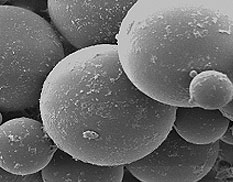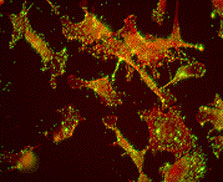RECENT UPDATES
1/22/08
Carigent Awarded NSF Phase I SBIR Grant
more
|
Newsroom
1/22/08
Carigent Therapeutics Awarded NSF Phase I SBIR Grant to Advance Development of Paclitaxel-Loaded Targeted Nanoparticles to Treat Ovarian Cancer
NEW HAVEN, Conn., January 22, 2008— Carigent Therapeutics, Inc., announced today that the National Science Foundation has awarded Carigent a six-month, $97,000 Phase I Small Business Innovation Research (SBIR) grant to engineer long-circulating nanoparticles that target delivery and enable controlled release of paclitaxel to ovarian cancer tumors.
Paclitaxel, a widely used chemotherapy drug sold under various brand names, including Taxol®, is a potent anticancer natural product used to treat patients with leukemia, lymphoma, and a number of solid-tumor malignancies including ovarian cancer, breast cancer, lung cancer, and brain cancer.
“Ovarian cancer is the leading cause of death from female reproductive system cancers and is often intractable to the current treatment, which is surgery followed by chemotherapy,” said Seth Feuerstein, MD, JD, President and a co-founder of Carigent. “The development of tumor-specific nanoparticles loaded with paclitaxel could provide a significant step forward in the efforts to fight this devastating disease not only by targeting the tumor and delivering the agent directly into it, but also by enabling greater uptake and deeper tumor penetration, resulting in enhanced drug efficacy.”
Carigent’s novel paclitaxel delivery program is based on the company’s proprietary technology for engineering biodegradable nanoparticles with exceptionally high-density surface modifications for the targeting of a drug or diagnostic agent to specific tissues and cells. The platform enables Carigent to design customized, multifunctional nanoscale carriers with the unique combined capability of:
• Tethering multiple “functional groups” such as targeting ligands, diagnostic imaging agents, and polyethylene glycol (PEG) to the nanoparticle surface at previously unattainable densities, and
• Encapsulating single or combined therapeutic and/or diagnostic agents inside the nanoparticle for sustained, controlled release directly into targeted (i.e., diseased) tissues and cells.
1/16/08
Carigent Therapeutics Awarded NCI Phase I SBIR Grant for Preclinical Development of Targeted, Long-Circulating Nanoparticle Therapeutic to Treat Non-Hodgkin’s Lymphoma
NEW HAVEN, Conn., January 16, 2008— Carigent Therapeutics, Inc., announced today that the National Cancer Institute of the National Institutes of Health has awarded Carigent a one-year, $153,000 Phase I Small Business Innovation Research (SBIR) grant to advance preclinical development of an innovative, long-circulating nanoparticle therapeutic that targets the specific molecular lesions in non-Hodgkin’s lymphoma (NHL) patients.
Carigent’s novel therapeutic approach is based on the company’s proprietary technology for engineering biodegradable nanoparticles with exceptionally high-density surface modifications. The platform enables Carigent to design customized, multifunctional nanoscale carriers with the unique combined capability of:
• Tethering multiple “functional groups” such as targeting ligands, diagnostic imaging agents, and polyethylene glycol (PEG) to the nanoparticle surface at previously unattainable densities, and
• Encapsulating single or combined therapeutic and/or diagnostic agents inside the nanoparticle for sustained, controlled release directly into targeted (i.e., diseased) tissues and cells.
“Non-Hodgkin’s lymphoma has one of the fastest-growing incidence rates among cancers and is now the sixth most common cancer in the U.S.,” said Seth Feuerstein, MD, JD, President and a co-founder of Carigent. “As we accelerate development of Carigent’s engineered nanoparticle therapeutics to address unmet needs in cancer treatment, we are grateful for this financial support from the National Cancer Institute and the additional validation it provides Carigent’s versatile nanoparticle delivery technology. The ability to modify particles for targeting as well as increased circulation time is what makes this an exciting project for the field.”
12/11/07
Carigent Therapeutics Completes Series A Financing; Advancing Nanotechnology for Controlled Delivery of Targeted Drugs and Diagnostics
—Engineered nanoparticulate delivery systems to improve drug targeting, efficacy, and safety—
NEW HAVEN, Conn., December 11, 2007— Carigent Therapeutics, Inc., announced today that the company has secured $2 million in its first round of private equity financing. Carigent is advancing a new drug delivery technology that aims to improve drug efficacy and safety by engineering nanoparticles that optimize delivery and controlled release of therapeutic and diagnostic agents into diseased tissues and cells. The financing was provided by Saint Simeon Marketing and Investments Lda. Carigent will apply the proceeds to further develop its nanotechnology platform, improve laboratory production capabilities and core expertise to support partnerships with pharmaceutical and biotechnology companies, and advance its lead therapeutic product candidates toward clinical studies.
Carigent’s products and services are based on novel nanotechnology developed at Yale University. The core technology enables exceptionally high-density anchoring, or “tethering,” of biological targeting agents to the surface of biodegradable nanoparticles that encapsulate drugs or diagnostic agents. This unique capability enables Carigent to design and engineer customized nanoscale carriers that are exceptionally versatile. On one hand, the platform allows for delivery and controlled release of therapeutic and diagnostic agents targeted directly to the site of pathology in specific tissues or cells, thus increasing delivered agent concentrations while minimizing systemic circulation of the drug and associated side effects. On the other hand, the technology has the capability to render the particles “stealthy” and increase the bioavailability and functional half-lives of therapeutics with formulation problems. An example of how the technology might work: Carigent nanoparticles engineered to deliver an anticancer therapeutic enter the disease environment, dispatch an increased dose of the encapsulated drug in a controlled fashion to the site of the tumor or within individual cancer cells, and the carrier degrades over time. The method thus leaves healthy tissues unharmed and minimizes systemic side effects.
Carigent’s multifunctional engineered nanoparticles incorporate FDA-approved PLGA, a polymeric material that has been used successfully in humans for decades. PLGA is the standard substrate used for controlled drug delivery formulations due to its biodegradable and biocompatible nature, as well as its ability to release encapsulated agents in a controlled fashion. Carigent’s platform supports encapsulation of virtually any drug or molecule inside the nanoparticle, in addition to attachment of a broad array of ligand molecules to the surface at previously unattainable and unprecedented densities. These surface modifications enable disease-specific homing for delivery of both therapeutics as well as noninvasive contrast-imaging diagnostics. The technology also supports combined targeting agents—for example, a diagnostic imaging agent linked with a drug—in a single delivery vehicle.
“Controlled delivery of drugs using biodegradable nanoparticles provides a more efficient and less risky solution to many of the challenges of systemic drug delivery, including administration of larger-than-necessary doses, dose-limiting toxicity, and poor specificity that can lead to harmful effects on healthy tissues,” said Seth Feuerstein, MD, JD, President and a co-founder of Carigent. “With this technology, Carigent is able to deliver on four key promises of improved drug delivery—the ability to control drug release, to target binding agents to a specific physiological site, to combine multiple payloads within the carrier, and to engineer delivery enhancements for existing drugs on the market or for drugs that have failed due to formulation or toxicity issues.”
The Carigent technology is exclusively licensed through Yale University and is based on discoveries by Carigent scientific co-founders W. Mark Saltzman, PhD, chairman of Yale University Department of Biomedical Engineering; Tarek Fahmy, PhD, assistant professor of biomedical engineering at Yale; and Peter Fong, PhD, Carigent’s Vice President and Chief Scientific Officer.
|
|
|



